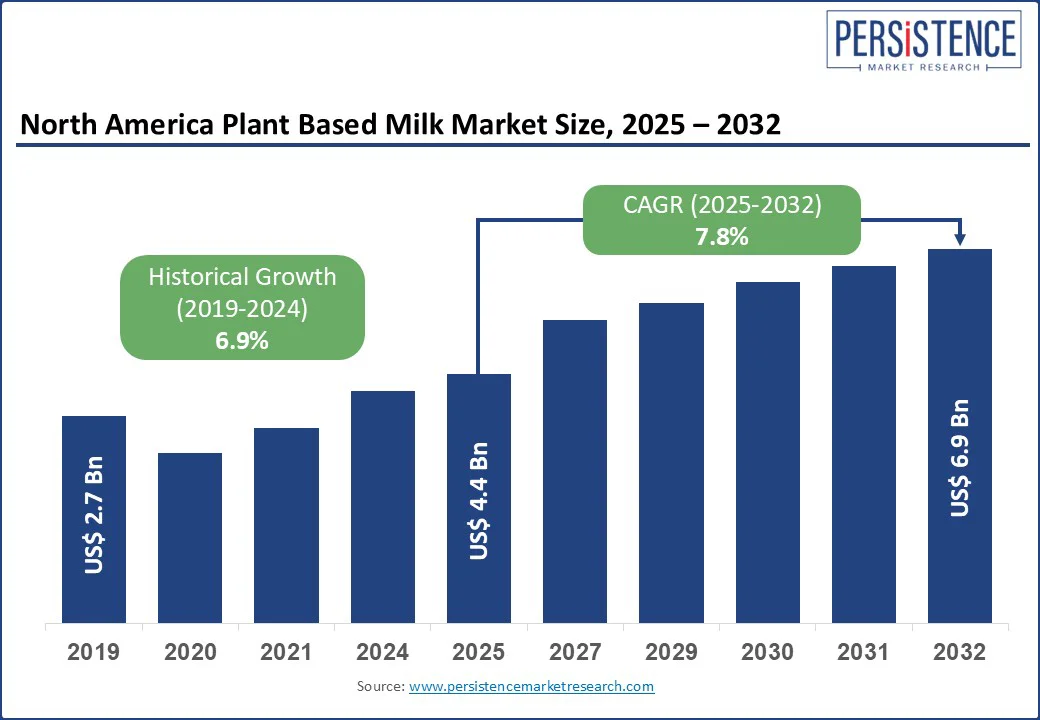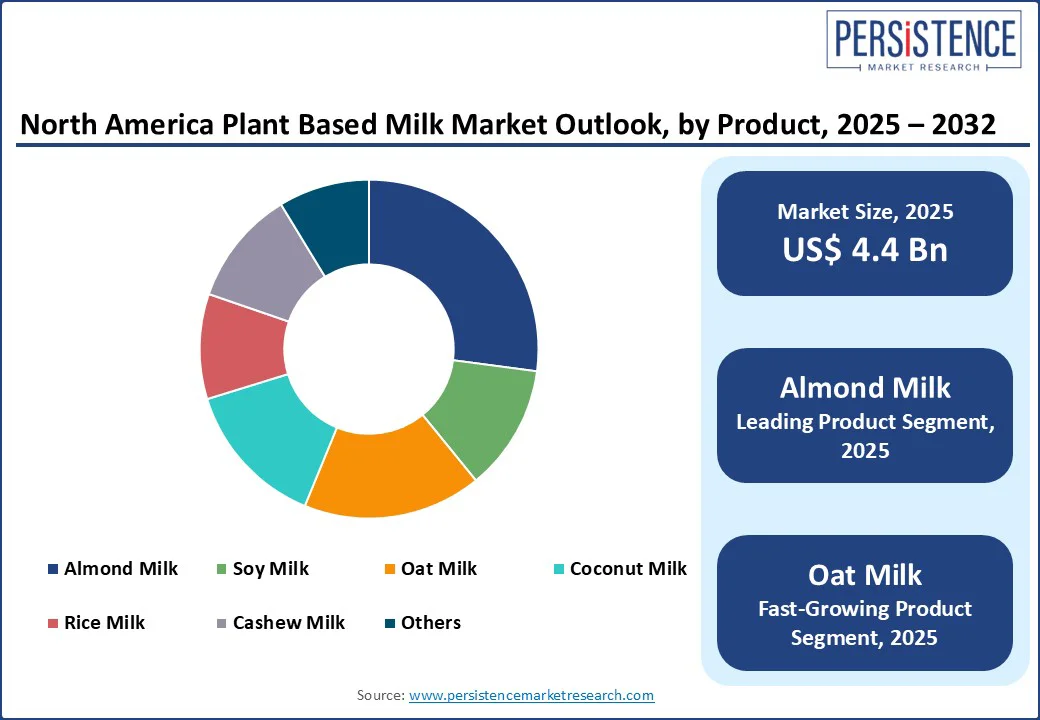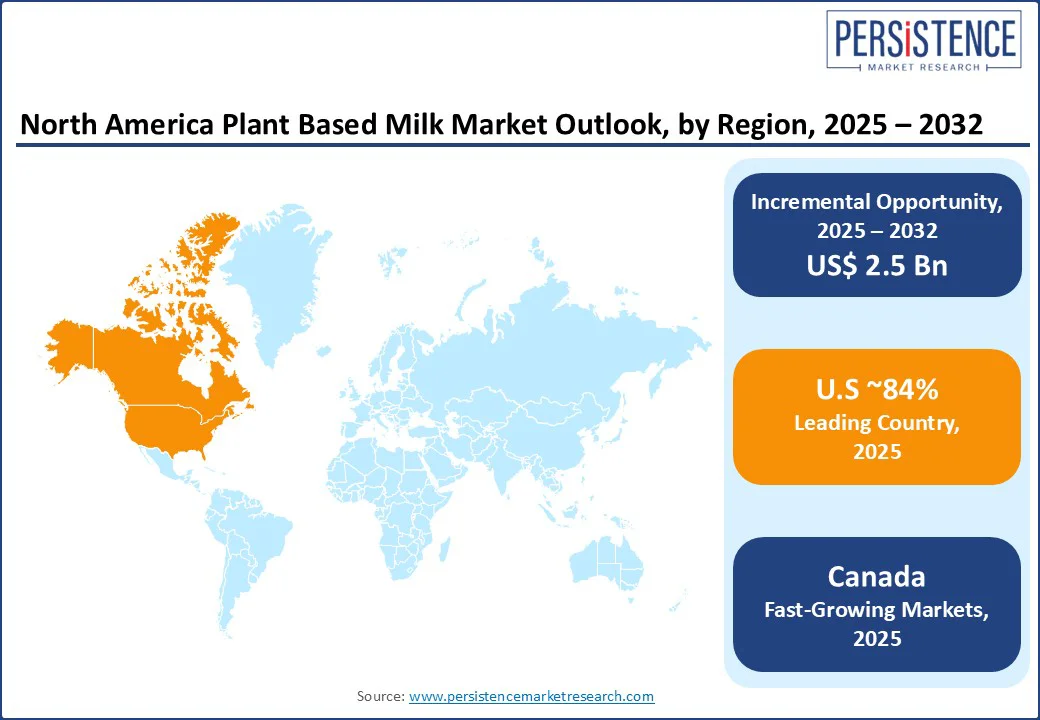ID: PMRREP34820| 169 Pages | 1 Aug 2025 | Format: PDF, Excel, PPT* | Food and Beverages

The North America plant-based milk market size is expected to increase from US$4.4 billion in 2025 to US$6.9 billion by 2032. It is projected to witness a CAGR of 7.8% from 2025 to 2032. The North America plant-based milk market has witnessed significant growth driven by rising lactose intolerance, growing vegan and flexitarian populations, and increasing health and sustainability awareness. Consumers are increasingly opting for alternatives like almond, oat, and soy milk due to their perceived health benefits and lower environmental impact. With expanding product variety and retail availability, plant-based milk is steadily transitioning from a niche to a mainstream category across the U.S. and Canada.

Key Industry Highlights:
|
Market Attribute |
Key Insights |
|
North America Plant Based Milk Market Size (2025E) |
US$ 4.4 Bn |
|
Market Value Forecast (2032F) |
US$ 6.9 Bn |
|
Projected Growth (CAGR 2025 to 2032) |
7.8% |
|
Historical Market Growth (CAGR 2019 to 2024) |
6.9% |
The growing prevalence of lactose intolerance and dairy protein sensitivity is significantly reshaping the North American milk market. Health-conscious consumers are turning to non-dairy beverages like almond, soy, and oat milk, which offer lactose-free, easily digestible alternatives. Sales of lactose-free and plant-based milk alternatives have risen sharply in recent years, reflecting a strong consumer shift away from traditional dairy.
Leading alt milk brands are innovating to meet shifting preferences; for instance, Mooala launched its Organic Barista Blend Oatmilk in August 2024, offering a clean-label, barista-style oat milk free from gums and artificial additives, catering to health-conscious and specialty coffee consumers alike. As traditional dairy responds with enzyme-treated products, plant-based milk brands differentiate through fortified, clean-label formulations. These milk substitutes are expanding shelf space in supermarkets, health food stores, and online retail, addressing both health-driven and eco-conscious buyers in the mainstream market.
Despite rising demand for dairy alternatives, plant-based milk adoption in North America faces several restraints. Premium pricing remains one of the key barriers most plant-based options cost 30–50% more than conventional dairy milk. This price gap makes them less accessible to budget-conscious households, especially in the high-inflation times . Additionally, many plant-based milks struggle to match the sensory attributes of dairy products. Issues such as watery texture, lack of creaminess, or an off-putting aftertaste can deter repeat purchases, particularly among flexitarians who compare directly with traditional milk.
Another significant restraint is allergen exposure. Popular bases such as almonds, soy, and cashews are among the top food allergens, limiting their reach among sensitive or at-risk consumers. Moreover, deep-rooted cultural and dietary preferences for dairy in several North American households continue to slow the shift. These combined factors limit mainstream penetration, despite the growing appeal of vegan, clean-label, and sustainable lifestyles.
With over 40,000 coffee shops across the U.S. and a strong consumer base among Millennials and Gen Z over one-third of people aged 18 to 29 report recently visiting a coffee shop there is increasing demand for creamy, froth-friendly, and clean-label dairy alternatives. Flavored oat milk variants such as vanilla, mocha, and sweet cream enhance the coffee experience, appealing to health-conscious and vegan consumers seeking taste variety alongside functional benefits.
In February 2024, Oatly launched new coffee-focused oatmilk creamers, including Vanilla, Mocha, and Sweet & Creamy flavors, appealing to both retailers and cafés. These offerings cater to the growing consumer preference for vegan milk alternatives, lactose-free milk, and non-dairy beverages with clean-label, froth-friendly formulations. Strategic partnerships with cafés and coffee chains allow brands to strengthen visibility, boost adoption, and unlock premium revenue potential in the thriving North American plant-based milk and alternative dairy market.
Almond milk remains the dominant product type within North America’s plant-based milk segment, supported by early market entry, broad brand availability, and ongoing innovation. Major brands such as Silk, Almond Breeze, and Califia Farms have cultivated strong consumer loyalty through extensive retail presence across supermarkets, health food stores, and online channels. This dominance is further reinforced by product innovations focusing on clean-label and simple ingredient formulations
In July 2025, MALK Organics launched a shelf-stable Vanilla Almond Milk made with only four ingredients and no gums or fillers, catering to the growing demand for natural and healthy non-dairy milk alternatives. Almond milk’s mild flavor, low-calorie profile, and versatility continue to attract lactose-intolerant and flexitarian consumers, solidifying its position as the preferred milk substitute in the U.S. and Canada.
Unsweetened plant-based milk formulations are increasingly preferred by health-focused consumers, especially among keto, diabetic, and clean-label buyers who avoid added sugars and artificial ingredients. Brands are responding with simple, nutrient-fortified options across almond milk, oat milk, and soy milk, catering to those seeking natural, low-carb, and functional beverages.
In May 2025, Califia Farms launched an Unsweetened Vanilla Almond Milk featuring no added sugars and clean-label certification, now widely available in major North American supermarkets and online stores. This aligns with the growing shift toward non-dairy milk alternatives that support specific dietary needs. The trend strengthens the role of unsweetened dairy-free milk as a go-to choice in wellness-focused and specialty retail segments, driving innovation and expanding market penetration.

The U.S. plant-based milk market is experiencing rapid growth as more consumers shift toward healthier and more sustainable lifestyles. Increasing awareness of lactose intolerance and dairy allergies, coupled with the rising popularity of vegan, flexitarian, and keto diets, is driving demand for dairy-free milk alternatives. Consumers today are seeking plant-based options that offer clean-label ingredients, nutritional benefits, and better environmental impact. This trend is expanding the appeal of almond, oat, soy, and other plant-based milks beyond niche markets, making them an essential part of everyday diets across the country.
In October 2024, Edenesque, launched its debut line of plant-based milks, including unsweetened oat milk, barista blend oat milk, and barista blend pistachio milk. The unsweetened oat milk offers 5 grams of protein per serving and less than 1 gram of sugar. These innovative products reflect the growing consumer demand for clean-label, nutrient-rich, and flavorful plant-based milk options across the U.S. market.
In Canada, growing health awareness and government nutrition guidelines encourage consumers to choose organic and clean-label plant-based milks. The Canadian Food Inspection Agency (CFIA) regulates organic certifications, ensuring strict standards that many buyers trust when selecting almond, oat, or hemp milk products. Public health campaigns emphasize reducing additives and processed ingredients, boosting demand for natural, minimally processed dairy alternatives.
In May 2024, Lactalis Canada, a subsidiary of the French dairy giant Lactalis, launched "Enjoy!", a new line of high-protein, unsweetened plant-based beverages. Each 250 mL serving contains 8 grams of pea protein and boasts a creamy texture suitable for frothing. The products are non-GMO, gluten-free, and free from artificial colors, preservatives, or flavors. With such innovations and consumer focus on health and sustainability, the Canadian plant-based milk market is poised for continued growth and diversification.

The North America plant-based milk market is highly dynamic and increasingly crowded, with both legacy dairy brands and emerging plant-based startups competing for shelf space. Product innovation, especially around taste, texture, and nutritional content, has become a key differentiator. Brands are leveraging clean-label claims, protein fortification, and sustainable sourcing to appeal to evolving consumer preferences.
Private-label offerings and diversified product lines are also intensifying competition, especially in supermarket and online channels. In response, players are expanding into barista-friendly formulations, organic-certified options, and functional variants tailored to niche dietary needs such as keto or diabetic diets, signaling a shift toward hyper-targeted consumer strategies.
The North America plant-based milk market is projected to value at 4.4 bn in 2025.
The North America plant-based milk market is driven by the increasing cases of lactose intolerance and dairy allergies.
The North America plant-based milk market is poised to witness a CAGR of 7.8% between 2025 and 2032
Expanding flavored oat milk product lines targeting baristas and café chains can unlock strong revenue in the foodservice segment.
Major players in the North America plant-based milk market include Nestlé, Oatly, So Delicious, Ripple Foods, Califia Farms, and others.
|
Report Attribute |
Details |
|
Historical Data/Actuals |
2019 - 2024 |
|
Forecast Period |
2025 - 2032 |
|
Market Analysis Units |
Value: US$ Bn, Volume: As applicable |
|
Country Coverage |
|
|
|
|
|
|
|
|
|
|
|
Customization and Pricing |
Available upon request |
By Product
By Formulation
By Packaging Type
By Sales Channel
By Country
Delivery Timelines
For more information on this report and its delivery timelines please get in touch with our sales team.
About Author